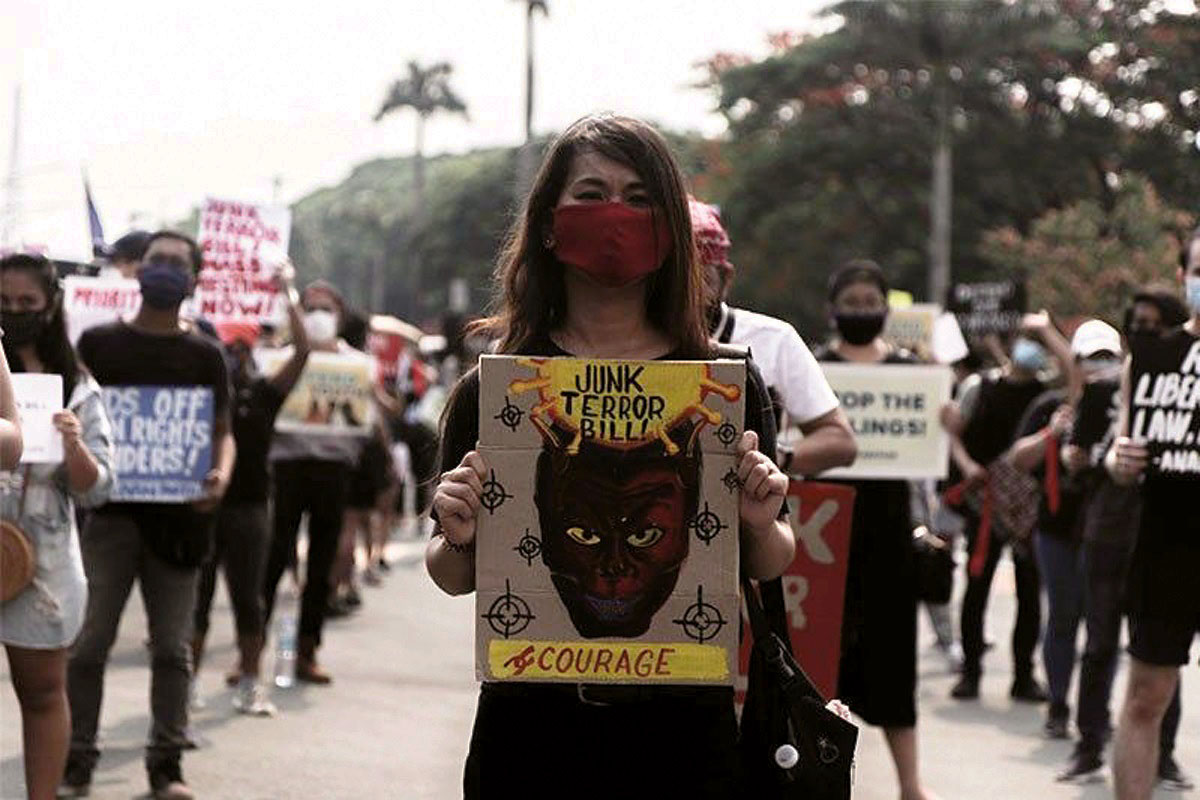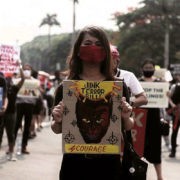
The controversial Anti-Terrorism Act of 2020 took effect on Saturday, July 18 in the Philippines, despite the lack of implementing rules and regulations.
“Considering that the law was published on July 3, it will take effect on July 18, which is the 15th day,” said Justice Secretary Menardo Guevarra on Friday, July 17.
He added that the drafting of the implementing rules and regulations (IRR) is “just about to start” and will be ready within 90 days.
“The law will take effect even without the IRR because the promulgation of the IRR is not a condition for the effectivity of the law. Some provisions are self-executing, like the organization of the ATC (Anti-Terrorism Council),” Guevarra said,
“But there are provisions where operational details need to be spelled out or standards clearly defined in the IRR for proper implementation of the law,” he added.
Under the anti-terror law — which expands on the Human Security Act of 2007 — incitement of terrorism can be done “by means of speeches, proclamations, writings, emblems, banners or other representations…without taking any direct part in the commission of terrorism.” Those arrested and detained may be held for 14 to 24 days.
The new law enables the suspected “terrorist” to also be placed under surveillance for 60 days, extendable by up to 30 more days, by the police or the military.
Acts punishable under the law include:
- Engaging in acts intended to cause death or serious bodily injury to any person, or endangers a person’s life;
- Engaging in acts intended to cause extensive damage or destruction to a government or public facility, public place, or private property;
- Engaging in acts intended to cause extensive interference with, damage, or destruction to critical infrastructure;
- Developing, manufacturing, possessing, acquiring, transporting, supplying or using weapons; and
- Releasing of dangerous substances, or causing fire, floods or explosions.
- Any person who proposes, incites, conspires, participates in the planning, training, preparation, and facilitation of a terrorist act, as well as those who will provide material support to terrorists and recruit members in a terrorist organization, will also be penalized by life imprisonment without the benefit of parole.
Meanwhile, anyone who threatens to commit terrorism, and those who propose any terroristic acts or incite others to commit terrorism, will suffer imprisonment of 12 years.
This goes the same for anyone who voluntarily and knowingly joins any organization, association or group of persons knowing that such is a terrorist organization.
‘Won’t violate human rights’
Philippine Ambassador to the United States Jose Manuel Romualdez, for his part, assured American lawmakers that the anti-terror law will not violate human rights.
In a letter dated July 16 addressed to the 50 U.S. lawmakers who recently asked for the law’s repeal, Romualdez pointed out that the anti-terror law “expressly excludes legitimate exercises of the freedom of expression and to peaceably assembly engaging in advocacy, protest, dissent, mass action and other similar exercises that are not intended to cause death or serious physical harm to a person, to endanger a person’s life, or to create a serious risk to public safety.”
“The Philippines remains committed to the protection of civil and political liberties as well as human rights. The Anti-Terrorism Act itself strongly mandates that human rights shall be absolute and protected at all times,” he said.
The envoy also assured that the law has safeguards in place to prevent abuses.
Romualdez noted that the Human Security Act of 2007, which the new law replaced, was ineffective in addressing terrorism threats in the Philippines.
“The Anti-Terrorism Act aims to plug the loopholes in the Human Security Act by putting in place a more effective legal framework that would enable a criminal justice response to terrorist acts beyond that allowed for by the Revised Penal Code,” he said.
“I appreciate the opportunity to openly communicate with esteemed members of the U.S. Congress on matters of sovereign importance to the Philippines, particularly inasmuch as these may have a bearing on the deep and long-standing alliance between our two countries,” he added.





